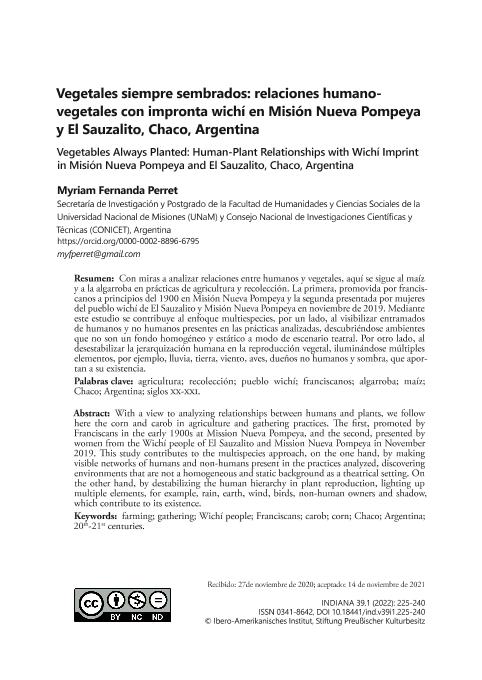Artículo
Con miras a analizar relaciones entre humanos y vegetales, aquí se sigue al maíz y a la algarroba en prácticas de agricultura y recolección. La primera, promovida por franciscanos a principios del 1900 en Misión Nueva Pompeya y la segunda presentada por mujeres del pueblo wichí de El Sauzalito y Misión Nueva Pompeya en noviembre de 2019. Mediante este estudio se contribuye al enfoque multiespecies, por un lado, al visibilizar entramados de humanos y no humanos presentes en las prácticas analizadas, descubriéndose ambientes que no son un fondo homogéneo y estático a modo de escenario teatral. Por otro lado, al desestabilizar la jerarquización humana en la reproducción vegetal, iluminándose múltiples elementos, por ejemplo, lluvia, tierra, viento, aves, dueños no humanos y sombra, que aportan a su existencia. With a view to analyzing relationships between humans and plants, we follow here the corn and carob in agriculture and gathering practices. The first, promoted by Franciscans in the early 1900s at Mission Nueva Pompeya, and the second, presented by women from the Wichí people of El Sauzalito and Mission Nueva Pompeya in November 2019. This study contributes to the multispecies approach, on the one hand, by making visible networks of humans and non-humans present in the practices analyzed, discovering environments that are not a homogeneous and static background as a theatrical setting. On the other hand, by destabilizing the human hierarchy in plant reproduction, lighting up multiple elements, for example, rain, earth, wind, birds, non-human owners and shadow, which contribute to its existence.
Vegetales siempre sembrados: relaciones humano-vegetales en Misión Nueva Pompeya y El Sauzalito, Chaco, Argentina
Título:
Vegetables Always Planted: Human-Plant Relationships with Wichí Imprint in Misión Nueva Pompeya and El Sauzalito, Chaco, Argentina
Fecha de publicación:
10/2021
Editorial:
Ibero-Amerikanisches Institut
Revista:
Indiana
ISSN:
0341-8642
e-ISSN:
2365-2225
Idioma:
Español
Tipo de recurso:
Artículo publicado
Clasificación temática:
Resumen
Palabras clave:
Agricultura
,
Recolección
,
Pueblo Wichí
,
Franciscanos
,
Algarroba
Archivos asociados
Licencia
Identificadores
Colecciones
Articulos(CCT - NORDESTE)
Articulos de CTRO.CIENTIFICO TECNOL.CONICET - NORDESTE
Articulos de CTRO.CIENTIFICO TECNOL.CONICET - NORDESTE
Citación
Perret, Myriam Fernanda; Vegetales siempre sembrados: relaciones humano-vegetales en Misión Nueva Pompeya y El Sauzalito, Chaco, Argentina; Ibero-Amerikanisches Institut; Indiana; 39; 1; 10-2021; 1-16
Compartir




